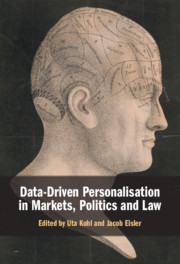Book contents
- Data-Driven Personalisation in Markets, Politics and Law
- Data-Driven Personalisation in Markets, Politics and Law
- Copyright page
- Contents
- Figures
- Tables
- Contributors
- Preface
- Part I Introduction: Theoretical Perspectives
- Part II Themes: Personal Autonomy, Market Choices and the Presumption of Innocence
- 5 Hidden Personal Insights and Entangled in the Algorithmic Model: The Limits of the GDPR in the Personalisation Context
- 6 Personalisation, Markets, and Contract: The Limits of Legal Incrementalism
- 7 ‘All Data Is Credit Data’: Personalised Consumer Credit Score and Anti-Discrimination Law
- 8 Sentencing Dangerous Offenders in the Era of Predictive Technologies: New Skin, Same Old Snake?
- Part III Applications: From Personalised Medicine and Pricing to Political Micro-Targeting
- Part IV The Future of Personalisation: Algorithmic Foretelling and Its Limits
- Index
7 - ‘All Data Is Credit Data’: Personalised Consumer Credit Score and Anti-Discrimination Law
from Part II - Themes: Personal Autonomy, Market Choices and the Presumption of Innocence
Published online by Cambridge University Press: 09 July 2021
- Data-Driven Personalisation in Markets, Politics and Law
- Data-Driven Personalisation in Markets, Politics and Law
- Copyright page
- Contents
- Figures
- Tables
- Contributors
- Preface
- Part I Introduction: Theoretical Perspectives
- Part II Themes: Personal Autonomy, Market Choices and the Presumption of Innocence
- 5 Hidden Personal Insights and Entangled in the Algorithmic Model: The Limits of the GDPR in the Personalisation Context
- 6 Personalisation, Markets, and Contract: The Limits of Legal Incrementalism
- 7 ‘All Data Is Credit Data’: Personalised Consumer Credit Score and Anti-Discrimination Law
- 8 Sentencing Dangerous Offenders in the Era of Predictive Technologies: New Skin, Same Old Snake?
- Part III Applications: From Personalised Medicine and Pricing to Political Micro-Targeting
- Part IV The Future of Personalisation: Algorithmic Foretelling and Its Limits
- Index
Summary
Credit-score models provide one of the many contexts through which the big data micro-segmentation or ‘personalisation’ phenomenon can be analysed and critiqued. This chapter approaches the issue through the lens of anti-discrimination law, and in particular the concept of indirect discrimination. The argument presented is that, despite its initial promise based on its focus on impact, ‘indirect discrimination’ is after all unlikely to deliver a mechanism to intervene and curb the excesses of the personalised service model. The reason for its failure does not lie in its inherent weaknesses but rather in the 'shortcomings' (entrenched biases) of empirical reality itself which any 'accurate' (or useful) statistical analysis cannot but reflect. Still, the anti-discrimination context offers insights that are valuable beyond its own disciplinary boundaries. For example, the opportunities for oversight and review based on correlations within outputs rather than analysis of inputs is fundamentally at odds with the current trend that demands greater transparency of AI but may after all be more practical and realistic considering the ‘natural’ opacity of learning algorithms and businesses’ ‘natural’ secrecy. The credit risk score context also provides a low-key yet powerful illustration of the oppressive potential of a world in which individual behaviour from ANY sphere or domain may be used for ANY purpose; where a bank, insurance company, employer, health care provider, or indeed any government authority can tap into our social DNA to pre-judge us, should it be considered appropriate and necessary for their manifold objectives.
Keywords
- Type
- Chapter
- Information
- Data-Driven Personalisation in Markets, Politics and Law , pp. 124 - 141Publisher: Cambridge University PressPrint publication year: 2021

